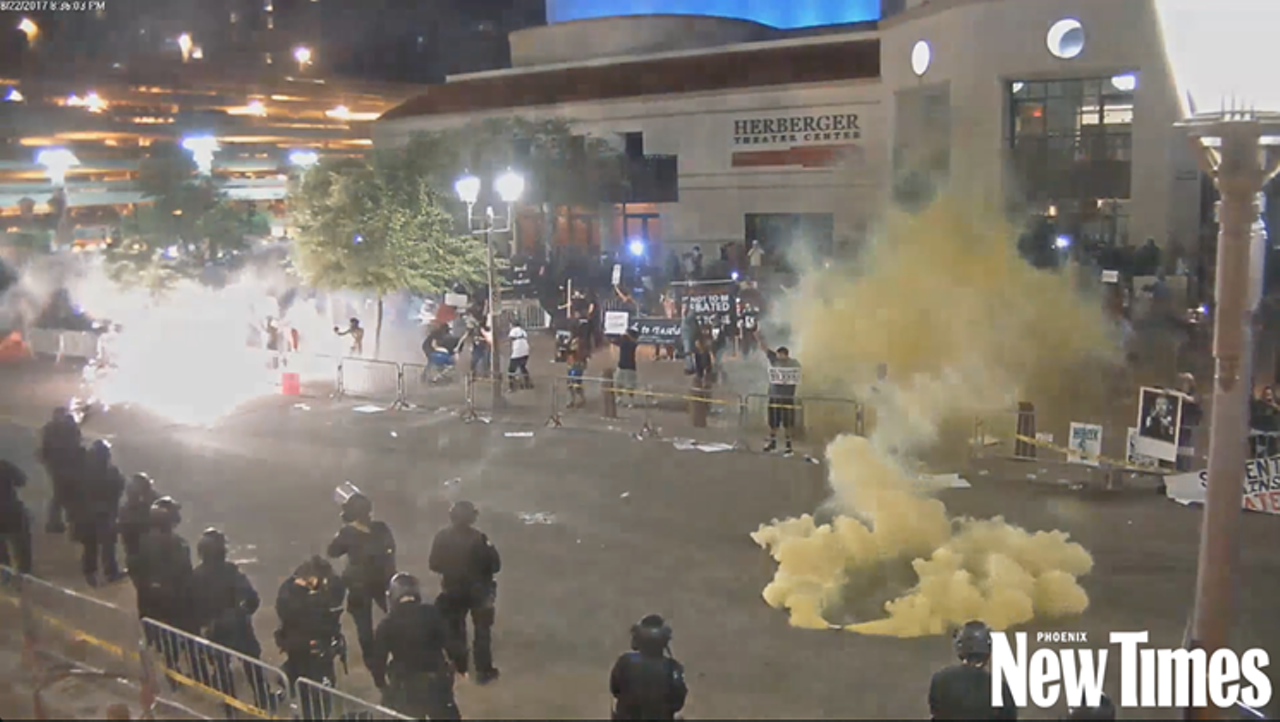
Phoenix Police Department

Audio By Carbonatix
The Phoenix City Council denied two citizen petitions that asked it to outlaw the use of city resources to facilitate future visits by President Donald Trump and to bar police from deploying chemical weapons on demonstrators.
The petitions were presented by Viri Hernandez of the Center for Neighborhood Leadership and Carlos Garcia of Puente Human Rights Movement at a February 7 meeting. Per the city charter, the Council was required to respond with an ordinance or resolution within 15 days. Accordingly, Council members took up the petitions at Wednesday’s formal meeting.
During Trump’s August 22 rally at the Phoenix Convention Center, police let loose on protesters with tear gas and pepper balls as the rally reached its conclusion, prompting a mad rush away from the barricade that separated police in riot gear and demonstrators.
According to Phoenix Police Chief Jeri Williams, the department has a mutual aid agreement with the federal government that requires city resources during a presidential visit. The city has not been reimbursed from Trump’s visit, Williams said, per the agreement.
But from Garcia’s perspective, it made no sense to underwrite a Trump rally when money is a constant topic at the Council and vital community services are stretched.
“To think that we spent three-quarters of a million dollars for this person, this president to come spew hatred and bigotry, to spit in our face and pardon the sheriff who was convicted: We paid for a campaign rally,” Carlos Garcia told the council.
The council unanimously denied the petition. Phoenix Mayor Greg Stanton said he strongly opposed Trump’s visit in August, but he agreed with the Phoenix police chief that the city has to provide policing resources when a president visits town.
“When it comes to public safety, we have an obligation to provide public safety services to any dignitary visiting our community,” Stanton said.
Council members then heard the petition on chemical weapons. Sandra Solis, who worked as a legal observer at the rally, testified that there were no warning when the first volley of chemical irritants hit observers. The police used force on the whole crowd instead of on the handful of troublemakers who were throwing rocks and water bottles, Solis said.
“If they were going after antifa, there was no reason why thousands of protesters should have been pepper-sprayed, including myself,” Solis said. “And if you want to know what if feels like, I invite you to the next protest where PPD is active.”
Maria Castro told the council that she met with Phoenix police liaisons in the days leading up to the rally, where Castro emphasized that if police wanted the demonstrators to disperse, they should call her cell phone and they’d leave the convention center. They never called, Castro said.
“It wasn’t until after I had aided over four dozen people who had been doused with tear gas and pepper spray and had wounds from the rubber bullets, that we afterward received a warning via helicopter telling the crowd to disperse,” Castro said. “This was not a proper warning – our rights were violated.”
Williams made the case for chemical crowd dispersal agents as a less dangerous crowd control tactic compared to the use of dogs or stun guns.
“If we do not have this tool available to us for our use, then officers have to go to other techniques in order to engage the crowd and to prevent unlawful activity. Those type of tools are batons, they could be stun guns, and sometimes it could be the use of canines,” Williams told the council. “And that is not sound policing.”
She also contrasted the Phoenix police response at the Trump rally in August with the chaos at the white supremacist rally in Charlottesville, Virginia, where a demonstrator was murdered. And Williams said that Phoenix police officers will soon have new masks that are better suited for issuing and hearing vocal commands.

Phoenix police used pepper spray and tear gas on demonstrators following the August Trump rally.
Phoenix Police Department
The meeting was contentious. A contingent of obnoxious Trump supporters, some of them wearing leather jackets and MAGA hats, made it clear that they felt insulted and upset that the petitions were even being considered. This led Stanton to patiently explain that if the council ignored the citizen petitions, it would violate the city’s charter.
Audience members also made their approval or disapproval known when speakers and council members spoke. Of the council members, Jim Waring in particular lamented the lack of “decorum” at the meeting. “You’d get kicked out of a second-grade class,” he chastised the crowd.
Waring also defended the police response in an exchange with Williams, where in response to Waring’s questions, the police chief said that there were no deaths or permanent injuries that she’s aware of.
“That sounds like success to me,” Waring said. “Combustible mix of people, obviously a lot of heat, a lot of people, a lot of differing views; no deaths, no permanent of disfiguring injuries, no property damage.”
His colleagues agreed. Kate Gallego and Michael Nowakowski also spoke up to recommend that the council deny the petition on chemical weapons, which the body voted down unanimously.
Stanton acknowledged that Phoenix police made mistakes in their response, but said that the department has addressed what could’ve been done differently in an after-action report. “It’s not a perfect department, but a great department as they are, they’re willing to learn,” Stanton said.